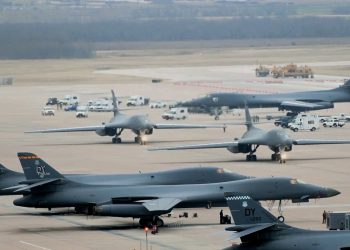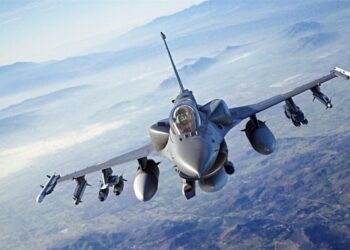US Air Force, WASHINGTON: The Air Force's top two leaders testified before the House Armed Services Committee about the service's budget request for fiscal 2009 Feb. 27 in Washington.
Addressing topics from recapitalization to personnel end strength, Secretary of the Air Force Michael W. Wynne and Air Force Chief of Staff Gen. T. Michael Moseley outlined how the upcoming year's budget focuses on the Air Force's top three priorities: Winning today's fight, taking care of people and preparing for tomorrow's challenges.
Secretary Wynne stressed to members of Congress that although the Air Force has been engaged in 17 years of continuous air combat, the service has seen a consistently underfunded modernization effort.
“Across the total force of active, Guard and Reserve airmen, and civilians, we are America's strategic shield in air, space and cyberspace,” he said. “We are contributing to today's fight with increasing ordnance drops, and we stand watch at the missile fields. We stand ready in the nuclear field, and we are an effective air superiority and strike force to both deter and dissuade any opponent.”
For these reasons, the Air Force must move forward in acquiring fifth-generation fighters, new expeditionary tankers and long-range strike assets, Secretary Wynne said He also emphasized the urgent need for modern space assets and a more concentrated focus on cyberspace as a warfighting domain the U.S. must dominate.
“Clearly beyond the war on terrorism, we must not lose America's asymmetric advantage in strategic forces,” the secretary said.
Earlier this month, the Air Force released its $143.9 billion fiscal 2009 budget request, and a few days later its $18.75 billion 2009 unfunded requirements. The unfunded requirements list includes additional items the Air Force needs that do not fall within budgetary constraints.
Unfunded requirements for additional aircraft such as F-22 Raptors, C-130 Hercules J-models, C-17 Globemaster IIIs, and F-35 Lightning II were of particular interest to members of Congress who questioned why the Air Force's unfunded list was so extensive in addition to the initial budget request.
“Since we went into the procurement 'holiday,' we've built up quite a backlog of procurement actions to be done, hence the growth in the age of the fleet … (that is reflected in) the unfunded requirements,” Secretary Wynne said.
“At some point in the future, we have got to fund the defense of America at the right level, and buy the defense that America deserves,” General Moseley added. “In the '09 budget, all the major programs are intact, (but) the economic order quantities are not there. Unless you buy planes and satellites, it's hard to field a combatant Air Force.”
Leaders also discussed Air Force end strength, which is projected to decrease from nearly 330,000 to 316,600 between now and 2009.
“We did not come to this decision lightly. It came down to 'if you want to have an Air Force, you have to buy airplanes, and you have to buy satellites,'” Secretary Wynne said.
However, there is an unfunded requirement for an additional $385 million to increase end strength for active-duty by 13,554, Reserves by 3,400 and civilians by 1,830 in 2009.
“We have more than 20,000 people tied up in 'in lieu of' taskings day to day. The new missions we're looking at in cyber, joint task force and joint commands takes us to a place where maybe 316,000 is truly too small,” General Moseley said. “Our discussion (with Department of Defense officials) now is how to level this off so we can relieve the stress of those mid-level NCOs and those family members, and still meet these taskings.
“Every issue comes down to affordability and prioritization,” he said. “The main reason our requirements list is (so large) is because we agreed that we would put everything on the table so there would be complete visibility. This is really about prioritizing within the baseline budget and trying to make the hard choices without breaking our people, our families or our mission, and still being able to reset and recapitalize.”
US bomber joins air drill with South Korea, Japan
South Korea, Japan, and the United States on Sunday conducted a joint air drill involving a heavy bomber, Seoul's military...









